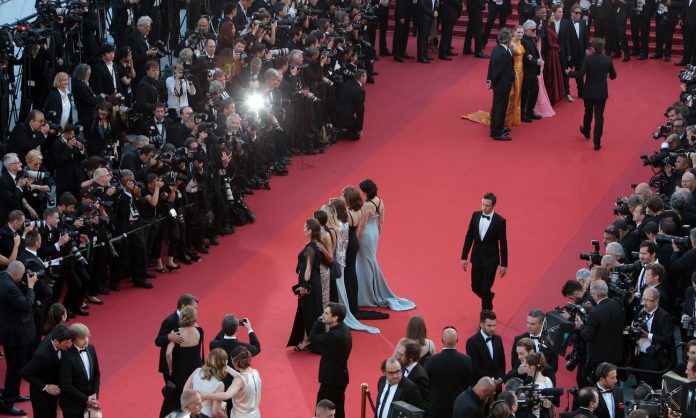With its outsize red carpet, compulsory sunglasses and auteur-worship, the Cannes film festival has been at the pinnacle of the international film festival circuit for decades. It somehow manages to shoehorn both movie-world glamour and austere artistic rigour into the same 10-day screening frenzy on France’s Côte d’Azur, packing movie stars on to its gala premiere conveyor belt as well as bestowing the Palme d’Or, one of the film industry’s most prized and valuable awards. But for this year’s edition, the 71st, Cannes is having to face up to the fact that business cannot go on as usual: the Harvey Weinstein scandal has seen to that.
Criticism of the festival’s response to the scandal is not hard to find. Kate Muir, former chief film critic of the Times and now a screenwriter and activist with the Time’s Up campaign, sees a direct equivalence between the apparent tolerance for harassment and exploitation and the festival’s seeming reluctance to select female film-makers for competition. ““Cannes itself is a two-week celebration of male brains and female beauty, as a walk down the Croisette in the evening will attest,” Muir says. “Many wheelers, dealers and producers still parade with paid-for models or prostitutes on their arms, which makes female film-makers deeply uneasy about what, precisely, is valued by the money men.”
The chaotic, frantic nature of Cannes – as one massive film after another, three or four a day, unspools in the town’s cinemas with all the attendant hangers-on and rubberneckers – can only work to a predator’s advantage. New Zealand actor Zoe Brock’s description of her encounter with Weinstein – which Weinstein’s representatives call “saturated with false and defamatory statements” – offers a flavour of the experience at its absolute top end: endless cocktail parties, limousines on permanent call, luxury hotel suites on standby. Brock also describes a culture of “bro” enablers that allowed the powerful to manipulate situations to their advantage.
Now Weinstein has vanished – practically overnight – from Cannes, the festival has made some moves towards dealing with the Weinstein-shaped hole that has suddenly appeared. It has set up a phone line to report incidents of sexual harassment, has appointed Cate Blanchett as jury president, and plans to stage an event under the banner of 50/50 2020 (France’s answer to Time’s Up) in which France’s minister of culture Françoise Nyssen and festival artistic director Thierry Frémaux will share a platform with international equality campaigners. But Cannes has seemingly failed to grasp the level of anger over the marginalisation of female film-makers: not only in its apparent eagerness to overturn its own ban on the director Lars von Trier – the subject of harassment allegations from his Dancer in the Dark star Björk – but even more straightforwardly, its inability to increase its dismal record of programming female directors. Last year, before the #MeToo and Time’s Up campaigns took hold, only three women were in competition: Sofia Coppola, Lynne Ramsay and Naomi Kawase. Twelve months later, out of 21 films in the competition, and after so much upheaval and uproar … again, three: Nadine Labaki, Eva Husson and Alice Rohrwacher.
That, however, is not the full story for Corrina Antrobus, founder of the Bechdel Test Fest, a film festival specifically designed as a showcase for films by and about women. “I never buy the answer that there aren’t enough films out there made by women. The problem does lie with the gatekeepers – of which Cannes is one – that are just not recognising they have to make more of an effort. The talent is there. If you are at the absolute top of the pile, as Cannes is, it’s easy to neglect the power you have to make a healthier film culture.”
“They are really turning a blind eye to all the work that’s going on for women in film. They have the power; it would be nice to see them engaging with the issues.”
Antrobus does, however, back the festival for its plan to put on the live 50/50 2020 event. “When Bechdel Test Fest started [in 2015] there was a lot of talking and not much doing. I feel for the first time we are doing productive things – unfortunately, it has been because of the news of the Weinstein monstrosities. Film festivals are the perfect place – because all the film industry is in the same room, together. If not at a film festival, when?”
Cannes’ resolute defence of its old-school male auteurs is, for many in Time’s Up, the other side of the same coin. Frémaux openly admitted he and festival president Pierre Lescure “worked hard” to convince the Cannes board to readmit Von Trier, the director they banned in 2011 for making Nazi jokes, and who Björk has alleged made “unwanted whispered sexual offers” when they worked together, (the company he co-founded in 1992 has also been subject to multiple harassment allegations). Muir says: “That Roman Polanski, Woody Allen and Lars von Trier are still feted regularly here leaves many ethical questions unanswered.” Poirier suggests that, as far as Cannes is concerned, “it’s all about the film”. “Polanski might be an appalling man but he is a genius film director. The French really do distinguish between the man and the artist – it’s the film they judge.” It surely cannot be a coincidence that the most high-profile film-world names to have expressed their exasperation with #MeToo – Catherine Deneuve, Michael Haneke, Woody Allen and Terry Gilliam – are all favourites at Cannes.
Cannes’ problems don’t end there, however. The festival has also found itself in confrontation with Netflix, which has refused to accept invitations to show any of its films after Frémaux excluded them from the main competition; this was apparently due to Netflix not guaranteeing its films cinematic releases in France. This deprives Cannes of such films as Paul Greengrass’s Anders Breivik biopic Norway, and Alfonso Cuarón’s 70s-set family drama Roma, not to mention the recently restored Orson Welles film The Other Side of the World. But it also makes Cannes look good: the keeper of the arthouse flame, standing up to the cash-flashing new kids on the block. Poirier says Netflix was “a bit silly” not to accept out-of-competition slots – given that films of the calibre of Solo: A Star Wars Story find no problem screening there. The standoff may or may not have ramifications for the wider industry, but would appear to chime with Cannes’ current difficulties in attracting significant US participation, in the face of ever-increasing pressure from the autumn “awards season” – where likely films opt to save themselves for an early autumn launch at Venice or Toronto to try to gain Oscar momentum, rather than chance it in Cannes in late spring.
Cannes may not have all its own way with Netflix, however. A younger generation is much less sniffy about streaming, and Cannes’ stance may quickly come to look old-fashioned. Moreover, as Antrobus points out, Netflix has put its money where its mouth is when it comes to supporting non-mainstream audiences and film-makers. “Netflix are doing a really good job of diversifying our film culture,” she says. “Streaming platforms are helping a lot of film-makers of colour find audiences. A film like Mudbound would surely have found an audience on the big screen; however I have spoken to Dee Rees [the director] herself and know she is over the moon about how Netflix have looked after her and her work, and given her the opportunity to reach a wide audience.
“And it’s also about those audiences that aren’t lucky enough to go to a cinema. Cinemas are expensive, and there are so many communities across the world for whom Netflix is a vital platform for reaching any kind of screen art.”
As Cannes prides itself on its progressive vision, providing a showcase for films from overlooked corners of the film industry (Poirier calls it “an Olympic Games of cinema”) this could well become the route to a compromise. The festival proudly announces its breakthroughs – this year, for the first time, a film from Kenya has made it to the Croisette – and it is easy to imagine Cannes and Netflix collaborating on some kind of outreach project, in areas with few if any cinemas.
However, it hardly helps that the festival has contrived yet another confrontation, this time with its 4,000-strong press corps which, when all is said and done, sustains the festival’s enormous media profile. By ending the tradition of morning press screenings – which regularly resulted in the trashing of high-profile films shortly before their glossy red-carpet premiere – Cannes seems to have antagonised all the critics at a stroke. It has also tilted the festival’s balance – always a tricky push-pull – away from critical debate and towards a film-business love-in. Other festivals have solved the problem with an embargo system, which prevents reviews from being published until after the public premiere; festival director Frémaux’s view is that the 1,200 or so critics who swarm into the early-morning preview cannot be contained.
Until the scandal broke, Harvey Weinstein was a personification of Cannes, exemplifying an ugly energy: brawling with his staff, intimidating the press, hustling his product on the street. Now he is gone, in what Frémaux described as an “earthquake”, it remains to be seen whether some of the festival’s overall energy has gone with him. On the face of it, Cannes is far bigger than one man, however individually powerful and influential he may be. But the bad taste of the Weinstein years will linger.
Source: https://www.theguardian.com/film/2018/may/04/cannes-crisis-lessons-weinstein-scandal






















































